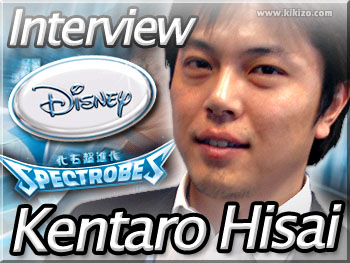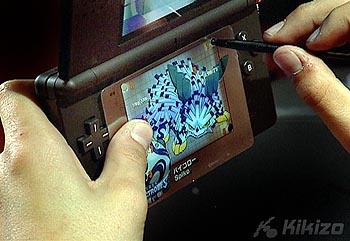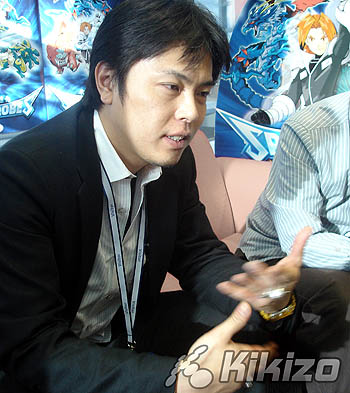Spectrobes: Kentaro Hisai Disney Interview
As Disney looks towards Japan to change its fortunes, we sit down with the former Jupiter Corp man producing the colossal new IP that is Spectrobes - starting with a DS game - for his most detailed interview yet published.
By Adam Doree
With its celebrated relationship with Pixar a distant memory, and kids all over the world obsessed with Japanese animation, Pokémon and the Manga-fication of traditional western brands like Turtles, The Walt Disney Company has taken a long, hard look at its future in the young adopter market and seemingly decided: if you can't beat 'em, join 'em.

At the highest levels of the sprawling media conglomerate Disney has ventured to Japan to develop an all-new, original property called Spectrobes, which has rapidly been gained momentum in the run up to its global launch later this month.
But, for the first time in Disney's history, Spectrobes is not launching as a film, or cartoon, or a TV drama on the ABC network. It seems these Spectrobes - the creatures that populate this new world of excavation, hunting and trading - are smart enough to know that the best way to spark kids' imaginations in these times of over-saturated, traditional media is the realm of videogames. Specifically, Nintendo DS.
And thus, Disney has teamed up with Jupiter Corp - the acclaimed Kyoto, Japan studio behind such titles as Kingdom Hearts: Chain of Memories to release the very first Spectrobes product. All going to plan, it could be a phenomenally big success for one of the world's largest media companies.
The anime-inspired action RPG for DS introduces two 'Planetary Patrol' officers named Rallen and Jeena who learn of strange, prehistoric creatures called Spectrobes that possess special powers, holding the key to defeating a vicious and merciless force known as Krawl, which threatens to destroy the galaxy. By excavating, awakening and training the Spectrobes - and with players using an all-new DS feature - not only will their future be saved, but so too, it seems, might Disney's.
We met with 36 year-old Kentaro Hisai, the affable producer of the entire Spectrobes project, the man responsible for launching one of Disney's biggest ever projects - and not to mention a game producer inspired by many forms of creative animation since a young age.
We wanted to find out just how big Spectrobes is really going to be, how serious Disney really is about its radical new direction, and what it all means to us as traditional gamers. And we came away from our exclusive, hour-long meeting with him decidedly enthused about what he told us. Read on, to be among the first gamers to discover why Spectrobes could be really be next big thing.
![]()
Kikizo: Thanks for your time today to talk about the launch of Spectrobes. Could you start by giving some history on your game development background to date?
Hisai: I have been making games for twelve years and have made about thirty titles so far. Disney Sports was one such title I worked on and many others were completely original properties. I'd spent a lot of time with Konami and moved towards Disney when it came to the idea of Spectrobes.
Kikizo: This is a major new project for Disney. How important is it for this Japanime style of product to be developed from within Japan, as opposed to the west?
Hisai: Well to talk about the bigger picture of Spectrobes, Disney has been working on things like established films and movies franchises and development of this content within that medium, but things along the lines of original content from scratch is itself new to Disney, and so it has to be really good; you can't afford to screw up. It has to be something very big. In terms of game developing, Japan is their obvious choice as I think they maybe consider it a place of new technology and trends. So in order to make it successful and to really to get everyone inspired it was developed and finished in Japan.
Kikizo: But do you think it adds authenticity, with the style of animation Spectrobes is aiming for - do you think the audience can tell if it's genuine Japanese production?
Hisai: I think people can tell the difference. If the Japanese try to have a go at developing western style things it can often turn out rather strange to westerners! And the same thing can happen in reverse, I think if you look into it, fans can tell the difference.
Kikizo: It's a worldwide launch for this game on the DS, has that been difficult to get all of the languages localised for each territory to make a global launch work?
Hisai: Developing the game itself was quite hard to begin with! But the localisation manager and international brand managers are directly involved with the production side. At the same time what was probably harder, was the marketing. Without a high degree of teamwork, we wouldn't have been able to come this far.
Kikizo: So you think one of the toughest aspects has been integrating with marketing around the world for example Buena Vista Games?
Hisai: Liasing with the team itself wasn't hard at all because we have developed Spectrobes together throughout the process, and everyone has a rapport and is very enthusiastic about it. However, according to which culture you're marketing towards, perhaps some part of the country may have different requirements or expectation for the use of Wi-Fi connection or some other feature that varies slightly depending on the region, and this aspect was tricky to make perfect.
Kikizo: So this is just the beginning of Spectrobes with the DS game. In what form will we see this IP afterwards, will it depend purely on the success of the DS game? And hypothetically even if the DS game does not perform so well, that is not to say it would be unpopular as another form of media is it?
Hisai: It's not really as simple as that. As the game producer, I would rather focus on what the game can do, and if it doesn't take off, well, that's just out of scenario; I don't even want to think about it. That is what I am responsible for, and the game is the platform and the arena, for me.
Kikizo: Is it fair to say that it's strategically best to target this audience by launching Spectrobes as a game first, and then TV for example where there's already a lot of competition in this field of entertainment, afterwards?
Hisai: Game as a platform was certainly never a second choice, because if you work on TV or films first, that is what Disney has been doing for the last seventy years. But gaming has since developed in its own unique light. And a game was the first choice for Spectrobes and it was not necessarily because this is an easier way to target.
Kikizo: So I think Jupiter Corp has developed this from scratch including characters, right? So I was curious does Disney bring to the table in terms of the early development of this franchise?
Hisai: Well, the view that Jupiter developed this is not necessarily be accurate; Jupiter is responsible for the programming side because they are really good at handheld device games, but in terms of the content, it's entirely Disney as it were. It's more of a joint venture effort in a sense. My role on Spectrobes is producer, and as a producer this role covers quite a vast area, including character design, but also managing communication and relationships between the other members of staff, and thinking about the future of Spectrobes, that is probably the important part of the producer's job.
 Players collect special cards that, when placed on the lower screen of the Nintendo DS, unlock and activate special content
Players collect special cards that, when placed on the lower screen of the Nintendo DS, unlock and activate special contentKikizo: Let's talk about the game a bit more. Since the beginning, Nintendo has encouraged developers to use the different unique features of the DS system, and since this is a major project that uses all the features, I assume Nintendo is quite supportive of the project, so have you had much direct support or involvement from Nintendo?
Hisai: Well, we have had a great deal in the way of major, major technical support from Nintendo in Japan as well as Nintendo of America and Nintendo of Europe. The card input system was one of the things, as was touch screen, and the feature that allows you to literally blow dust off the fossil by utilising the microphone. There's also the statistics data that you can save and upload via Wi-Fi connection and that's both ways, upload and download, where you can store the data from your system to a dedicated server. That was completely new to Nintendo, and Nintendo has been very supportive about these new concepts. In terms of the different regional offices of Nintendo, like America and Europe, they have their own codes of practise or standards as it were, and in order to make this worldwide launch possible, Nintendo helped us a lot to write unique special code for Spectrobes, they have generally been very supportive. For example also, with testing the Wi-Fi connection, they built a special Wi-Fi server for the testing, and it's this kind of dedicated support we're talking about.
















 Satoru Iwata Video Interview - the late Nintendo president spoke with Kikizo in 2004 as 'Nintendo Revolution' loomed.
Satoru Iwata Video Interview - the late Nintendo president spoke with Kikizo in 2004 as 'Nintendo Revolution' loomed. Kaz Hirai Video Interview - the first of Kikizo's interviews with the man who went on to become global head of Sony.
Kaz Hirai Video Interview - the first of Kikizo's interviews with the man who went on to become global head of Sony. Ed Fries Video Interview - one of Xbox's founders discusses an epic journey from Excel to Xbox.
Ed Fries Video Interview - one of Xbox's founders discusses an epic journey from Excel to Xbox. Yu Suzuki, the Kikizo Interview - we spend time with one of gaming's most revered creators.
Yu Suzuki, the Kikizo Interview - we spend time with one of gaming's most revered creators. Tetris - The Making of an Icon: Alexey Pajitnov and Henk Rogers reveal the fascinating story behind Tetris
Tetris - The Making of an Icon: Alexey Pajitnov and Henk Rogers reveal the fascinating story behind Tetris Rare founders, Chris and Tim Stamper - their only interview? Genuinely 'rare' sit down with founders of the legendary studio.
Rare founders, Chris and Tim Stamper - their only interview? Genuinely 'rare' sit down with founders of the legendary studio. The History of First-Person Shooters - a retrospective, from Maze War to Modern Warfare
The History of First-Person Shooters - a retrospective, from Maze War to Modern Warfare